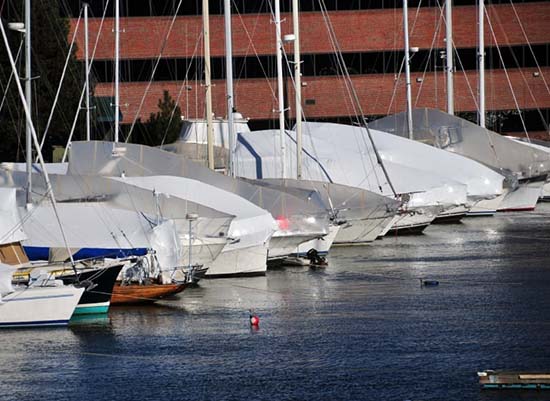
When the weather gets rough, boat owners all over the world have to throw anchor and cover their boats. But, there are so many different types of covers. What fabric do you use? Should you customize? What works best for fresh or sea water boats?
One of the best ways to ensure your boat is protected while stored or trailering is to get your cover custom fitted by your local canvas shop and preferably a canvas shop that is a member of the Marine Fabricators Association (MFA) and uses Herculite Inc. as a fabric supplier.
But if you choose to purchase a premade cover, there are a variety of options you can pick from. You can get a basic universal cover or you can go with something that has a few more features.
A good cover will be designed to allow your boat to breathe, stay protected from harmful ultraviolet rays, and keep rain from getting inside.
Boat covers can be made from simple cottons, to complex vinyl, acrylic, and polyester materials. When choosing the right boat cover for you, keep in mind where you’re storing your boat. If it’s in a storage facility, where it’s out of the sun and rain, then a simple universal cover might work for you.
However, if you’re storing your boat out on the water, then a boat cover that’s water and mildew resistant, with UV ray protection, and heat, cold and abrasion resistance is a better choice. While the cost of getting a cover like this might be more, it’s well worth the investment to protect your water craft. Plus, these types of covers often come with a warranty. Herculite Inc. offers a great 5 year limited warranty on some of its Marine Fabric products which helps give customers peace of mind.
Boat covers for fresh or sea water should have the above mentioned qualities, especially breath-ability and water resistance. You want your cover to allow your boat to be able to let moisture escape yet also repel water from entering. Using a cotton based material probably won’t stand up to the test of time or to the rigors of the outdoor. Plus, cotton is not naturally water resistant making your boat susceptible to rain. Eventually, the fibers of the natural materials will breakdown. Plus, cotton doesn’t stand up too well against UV rays and mildew.
So really, using a synthetic material based boat cover is likely a better option. Synthetic materials like vinyl and polyester compounds offer the protection your boat needs. Plus, these boat covers are often times lighter and easier to clean. (Remember, you still have to wash that boat cover even if it has been raining!)
Keep in mind, when you’re trailering your boat to your favorite beach or lake, you need a cover that’s going to stand up to the rigors of high speed. Using a cover that will stretch and stay durable during transportation is just as important as its stationary qualities.
For the right boat cover, remember custom designing and fitting is the best option. For more about boat covers and to find the right one for you, visit www.herculite.com/marine-fabrics